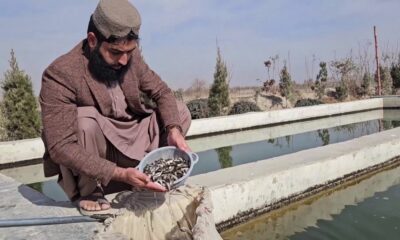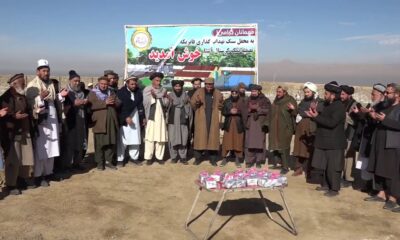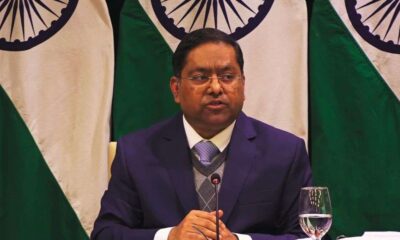Latest News
Pakistan has right to attack TTP in Afghanistan: PM’s adviser

Pakistani Prime Minister's Adviser on Political Affairs Rana Sanaullah has claimed that his country has the right to conduct operations against the Tehreek-e-Taliban Pakistan (TTP) on Afghan soil.
In an interview with Samaa TV, he said that the Pakistani government is at war against the TTP and will target members of this group wherever they are.
“According to the international law, if there is a threat of attack on your country from outside or there is preparation for it, you have the right to conduction operation against your enemy to protect yourself. If such thing happens, our forces will take right action at the right time,” he said.
Meanwhile, Pakistan’s Planning Minister Ahsan Iqbal has said that the government of Pakistan had always conveyed it to the government of Afghanistan through dialogue that it should stop Afghan land to be used for terrorism in Pakistan.
He said that the Pakistani people had made numerous sacrifices for the people of Afghanistan and were facing consequences till today. He hoped that Afghanistan would take notice and not allow any group to use Afghan land for carrying out terrorism in Pakistan.
Iqbal said that the government was making sincere efforts, adding that reasonable dialogue from both sides always yields positive results.
Pakistani military carried out airstrikes in Barmal district of Paktika province in Afghanistan last month, killing dozens of people, including women and children. The Islamic Emirate retaliated with attacks across the Durand Line.
Yesterday, Deputy Foreign Minister for Political Affairs Sher Mohammad Abbas Stanikzai warned Pakistan to refrain from violating the territorial integrity of Afghanistan, otherwise it will receive a strong response from Afghanistan.
Latest News
Iran will use ‘all means’ to restore water rights from Afghanistan

Iran’s foreign ministry said on Monday Tehran will use all means to restore its water rights from Afghanistan and that the Islamic Emirate should take the issue seriously.
Ismail Baqaei, the spokesman for the foreign ministry, said in response to a question at a press conference on the construction of water dams in Afghanistan, that Tehran has been following the issue closely for some time now and has lodged objections to the issue of dams being built in Afghanistan, IRNA news agency reported.
“It is clear that the waters that have flowed from Afghanistan to Iran for thousands or millions of years create rights for parties on both sides of the border,” Baqaei said, adding that there is a specific agreement in this regard.
"We will use all means to restore rights in this regard," he added.
The official also said that Iran’s acting ambassador in Kabul is following up on the issue of water rights.
The issue of water rights has been a source of tension between Afghanistan and Iran over the past few years.
Recently, Fida Hossein Maliki, a member of Iran’s parliament, expressed concern about the construction of water dams in Afghanistan and said that this issue is questionable.
He said that the current rulers of Afghanistan are treating neighboring countries, including Iran, in a way that has not been seen in the past.
The Islamic Emirate has repeatedly emphasized that it is committed to ensuring Iran's rights in accordance with the 1973 treaty, but Iran must also consider that the country is dealing with a drought.
Baqaei’s comments on Monday, follow close on the heels of his remarks Friday when he underscored the critical need for cooperation between Iran and Afghanistan to maintain the natural flow of water in shared border rivers.
He also noted Iran’s long-standing role in hosting millions of Afghan nationals over the past five decades. These enduring ties, he said, underscore the importance of mutual respect and collaboration in addressing shared challenges.
On Friday, Baqaei called on Afghanistan to respect these rights and cooperate in ensuring the continued flow of water.
"The principle of good neighborliness should guide our efforts," Baqaei stated, adding that equitable use of shared water resources is essential for the well-being of both nations.
Recently, Afghanistan's rulers announced they had begun filling the Pashdan Dam, located near Herat on the Harirud River.
The development adds to long-standing disputes over the Helmand River, which dates back to the 19th century.
Although a 1939 treaty was drafted to address water sharing, it was never ratified by Afghanistan, leading to protracted disputes.
In 1973, the two nations agreed that Afghanistan would allow a flow of 26 cubic meters per second—equivalent to 820 million cubic meters annually—into Iran.
Latest News
India condemns Pakistani airstrikes on Afghanistan

India’s Ministry of External Affairs on Monday condemned Pakistan's recent airstrikes on Afghanistan, which caused civilian casualties.
“We have noted the media reports on airstrikes on Afghan civilians including women and children, in which several precious lives have been lost,” Indian foreign ministry spokesperson Randhir Jaiswal said in a statement.
“We unequivocally condemn any attack on innocent civilians. It is an old practice of Pakistan to blame its neighbours for its own internal failures. We have also noted the response of an Afghan spokesperson in this regard,” he added.
Nearly two weeks ago, bombardment by Pakistani military aircraft in Afghanistan's eastern Paktika province killed at least 46 people, most of whom were children and women.
The Islamic Emirate said it retaliated targeting several points across the Durand Line.
Latest News
Kandahar farmers replace poppies with pistachios
Some farmers in Kandahar said however that establishing a pistachio orchard was costly and urged the Islamic Emirate government to assist them.

Farmers in Afghanistan’s southern province of Kandahar have taken a solid step towards replacing poppy fields with pistachio plantations.
Local officials said that so far, 115 tons of pistachios have been harvested from 150 hectares of cultivated land.
They said pistachio farming is proving to be an effective alternative to poppies and that the local government is trying hard to encourage farmers to plant pistachio trees.
Most pistachio production occurs in countries with arid climates.
Turkey, Iran, Italy, and Syria are the principal pistachio producing countries, outside the United States and pistachio nuts are grown mainly for export in those countries.
Trees are also grown in Pakistan, Greece, India, and Australia.
According to some local farmers, they tend their pistachio orchards daily and employ between 30 and 60 workers.
Some farmers in Kandahar said however that establishing a pistachio orchard was costly and urged the Islamic Emirate government to assist them.
Officials from Kandahar’s Department of Agriculture, Irrigation and Livestock said pistachio farming was a good alternative to poppy cultivation. They in turn called on former poppy farmers to consider planting pistachio trees.
Pistachio trees can live up to 300 years, but they take five to seven years to begin producing nuts.
They are alternate-bearing, meaning that the harvest is heavier in some years than others.
Peak production is reached around 20 years.
-

 Latest News5 days ago
Latest News5 days agoMinistry: $1 billion invested in Afghanistan’s poultry production sector
-

 Latest News5 days ago
Latest News5 days agoDeclining water levels affect 50 percent of fish farms in Kandahar
-

 Latest News5 days ago
Latest News5 days agoSalt refinery plant to be built in Takhar province
-

 Latest News5 days ago
Latest News5 days agoHostility towards Afghans has spread to Pakistani Pashtuns: Gandapur
-

 Tahawol4 days ago
Tahawol4 days agoTahawol: IEA’s response to accusations of Pakistan
-

 Latest News4 days ago
Latest News4 days agoAzizi expresses concern, says Afghans invested billions in neighboring countries
-

 Tahawol3 days ago
Tahawol3 days agoTahawol: Afghanistan in the US spotlight discussed
-

 Interviews3 days ago
Interviews3 days agoDebate with acting Minister of Industry and Commerce























